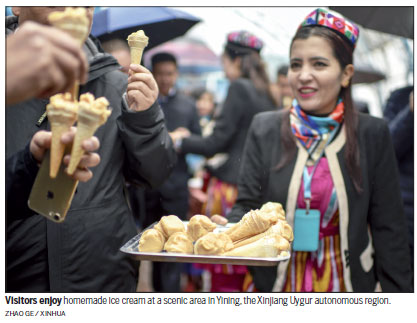Happy days at small town ice cream stall: Who needs Haagen-Dazs?

Memetyusup Sidiq has never heard of Haagen-Dazs, but he is certainly proud of his homemade ice cream, which is a real treat in Northwest China's sweltering summer.
Haagen-Dazs - a name intended to resemble the Danish for "happy days" - was founded only 56 years ago. Margilan, the ice cream store Memetyusup inherited from his father, has been serving up creamy delights for 84 years, and it was 57 years ago that a 10-year-old Memetyusup began to learn the secrets of his father's trade.
In 1933, Memetyusup's father left what was then the Soviet Union for Yining city, in what is now Xinjiang Uygur autonomous region, and started selling ice cream. Back then, it was the only ice cream in town.
Today, Memetyusup is still producing the "taste of childhood", as one customer put it, made simply with milk, eggs, sugar and no additives. The recipe has changed little, but today a mixing machine has cut down some of the hard work. The precise proportion of ingredients is a secret known only by Memetyusup himself.
The ice cream master "adjusts the proportions according to the quality of milk so that the flavor remains constant", said Adiljan Eysaq, 22, Memetyusup's grandson and apprentice.
One of Adiljan's daily chores is to scour two ginormous iron pots, each weighing 250 kilograms. It is the first and one of the most important steps in making perfect Margilan ice cream. Before Adiljan was allowed to do it by himself, he was under the close supervision of his grandfather for six years.
"If the pot is not clean, the ice cream will go sour," Adiljan explained while scrubbing with a whetstone that has been used for 17 years.
After that, Adiljan pours milk into the sparkling pot, and Memetyusup adds just the right amount of sugar.
The milk is then brought to the boil. "Duration and temperature are the key," said Memetyusup. "Too hot and the milk will be burned; not enough heat and the sugar will not melt."
It takes him five hours to produce the perfect caramel milk. Then he adds eggs, stirs the mixture thoroughly, and puts it in the freezer.
While the mixture freezes, Memetyusup constantly tastes it and adjusts the flavor. "It's the hardest step, a real skill, and needs years of practice," he said.
When the mixture has sufficiently crystallized, Memetyusup spends another 40 minutes stirring before freezing again. Only then is the signature ice cream ready.
A scoop of Margilan ice cream is about the same size as a small carton of Haagen-Dazs, but sells for only 2 yuan (30 US cents).
Memetyusup shakes his head when he learns that the ice cream of his United States "competitors" costs 15 times as much. Price, he said, is not necessarily an indicator of quality.
"For 57 years, I've made a living through ice cream. My family, including my wife and our five children, are well off thanks to my ice cream," said the proud entrepreneur, who has turned his father's small stall into a busy store.
He expects to pass on the craft to Adiljan and is optimistic about the future, as his store is in a folk tourism area, which features local multi-ethnic dwellings and ancestral handicrafts like iron pot casting and saddle making.
In peak season, Memetyusup can sell 70 kilograms (15 pounds) of ice cream a day. To attract more customers, Adiljan is developing new flavors by adding local dried fruit and almonds.
But the regular customers still prefer the original flavor.
"It's the flavor of my hometown," said Xin Yanhua, 55. She comes to Margilan all year round. She usually treats herself to three scoops, or buys 1 kg to take home for her children.
"Young people prefer big brands in the supermarket," she said. "But I just love homemade ice cream. It is the taste of happy days."
Xinhua









